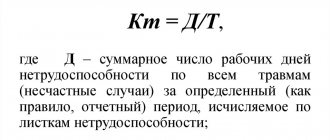In the production activities of any team, the inevitability of performing work that was not previously planned, but turned out to be urgent at the moment, may arise. An organization or enterprise will be able to carry out its specific functions only after the successful completion of these matters in a timely manner. Such emergency conditions characterize the need to take certain production measures at this moment.
The concept of production necessity in the Labor Code of the Russian Federation
What is production necessity?
In labor law there is no single definition of production necessity.
The mention of it in legislative documents relates to certain circumstances and is stipulated in some articles:
- Article 101 of the Labor Code of the Russian Federation.
- Article 125 of the Labor Code of the Russian Federation.
- Article 113 of the Labor Code of the Russian Federation.
- Article 99 of the Labor Code of the Russian Federation.
- Article 72.2 part 2 and 3 of the Labor Code of the Russian Federation.
- Federal Law - N 417 dated December 7, 2011.
Here we mean the following situations:
- related to disaster prevention;
- liquidation of the accident and its consequences at the production site;
- to minimize the forces of destruction during a natural disaster;
- to prevent the occurrence of accidents for a number of reasons of any nature;
- prevent property losses;
- provide a replacement for the absent employee.
In everyday work environments, disruptions may occur for economic, technological, technical and organizational reasons. The production need that arises is resolved by the team by order of the enterprise administration. Due to production needs, temporary transfer to another position is permitted.
What types of production needs can be distinguished?
Very often, employers pronounce the words “production necessity” in all cases in which they want to see a worker at work during periods of his vacation or after the end of working hours. Nevertheless, the legislation of the Russian Federation assigns the following grounds to this concept:
1. Disasters and emergencies of a civil and military nature.
2. Man-made and natural disasters.
3. Unforeseen production downtime (reasons may vary).
4. Replacement of an employee whose absence was due to an emergency.
5. Restoration of damaged property belonging to the organization.
In the case of replacing an absent employee, a transfer is possible not only for a period of up to one month, but also for the entire period of his absence.
Working beyond the established time limit
The labor legislation of the Russian Federation established a 40-hour working week as the norm for workers of all forms and types of activities, labor agreements and other conditions. According to the Labor Code of the Russian Federation, processing in excess of the legal norm is allowed.
This means that an employee can work for additional pay more hours than is required according to the norm in a shift or in one working day, as well as in excess of the hours of the accounting period. Processing is allowed up to 2 hours per day, up to 120 hours per year.
Article 99 of the Labor Code of the Russian Federation outlines the conditions for such work:
- The decision on production necessity comes from the employer.
- Activities are carried out beyond the established time limits to complete the work started.
- To carry out the repair process, eliminate the causes, in order to avoid stopping the plant.
- In continuous production, the absence of a shift worker is grounds for overtime work.
Delay at the employee's workplace at his discretion is not overtime work and is not paid. Sometimes an employer has the right to involve an employee in overtime work without his consent.
This is acceptable if:
- there is a need to prevent threatening production circumstances (man-made disasters, accidents, destructive phenomena);
- violations were discovered in the supply of water or gas, heat and electricity, problems with transport and communications;
- an emergency occurred (fire, flood, etc.).
Employee transfer
A striking example of production necessity is the temporary transfer of an employee, provided for in Parts 2 and 3 of Art. 72.2 Labor Code of the Russian Federation.
In exceptional cases that threaten the life of the population or its normal life (natural/man-made disasters, industrial accidents, industrial accidents, fires, floods, famine, earthquakes, epidemics or epizootics), in order to prevent them or eliminate the consequences, it is possible to transfer an employee without his consent for another job not stipulated by the employment contract with him, for a period of up to one month.
A similar right is granted to the employer in situations of downtime caused by the circumstances listed above. Only transfer to a less qualified job requires the written consent of the employee.
Work on legal rest days
Work on weekends
In all countries of the world there are days when a person can rest, that is, he has legal rest time. Article 113 of the Labor Code of the Russian Federation stipulates that on these days the employee is prohibited from being involved in work.
However, sometimes a situation arises that requires mandatory, urgent action, regardless of the day off or holiday. The current unusual situation may pose a threat to the peace and well-being of the population.
In the modern world, disasters, natural disasters, and man-made accidents occurring at an enterprise are not uncommon. Here it is necessary to organize operational protective actions. To carry out urgent urgent activities in order to prevent accidents, destruction, and all kinds of property damage, labor activities are allowed on weekends.
The same rules apply to workers in the media, cinema, theater, and people employed in the creative field. Social and labor relations under such a labor regime are regulated by commissions that deal with labor issues, consider collective agreements and regulatory agreements.
Payment corresponds to the exclusivity of the moment:
- Workers with piecework basic pay are given double earnings.
- Workers with daily and hourly rates receive double payment in accordance with the basic rate.
- According to official salary - daily earnings for one working day are added on top of the salary.
What is production necessity? | Saransk
The current version of the Labor Code of the Russian Federation does not contain the concept of “production necessity”. The best answer to your question is Art. 113 Labor Code of the Russian Federation:
“Article 113. Prohibition of work on weekends and non-working holidays. Exceptional cases of attracting employees to work on weekends and non-working holidays
Work on weekends and non-working holidays is prohibited, except as provided for by this Code.
Involvement of employees to work on weekends and non-working holidays is carried out with their written consent if it is necessary to perform unforeseen work, on the urgent implementation of which the normal work of the organization as a whole or its individual structural divisions or an individual entrepreneur depends in the future.
Involving employees to work on weekends and non-working holidays without their consent is permitted in the following cases:
1) to prevent a catastrophe, industrial accident or eliminate the consequences of a catastrophe, industrial accident or natural disaster;
2) to prevent accidents, destruction or damage to the employer’s property, state or municipal property;
3) to perform work the need for which is due to the introduction of a state of emergency or martial law, as well as urgent work in emergency circumstances, that is, in the event of a disaster or threat of disaster (fires, floods, famine, earthquakes, epidemics or epizootics) and in other cases, threatening the life or normal living conditions of the entire population or part of it.
Involvement in work on weekends and non-working holidays of creative workers of the media, cinematography organizations, television and video crews, theaters, theatrical and concert organizations, circuses and other persons involved in the creation and (or) performance (exhibition) of works, in in accordance with the lists of jobs, professions, positions of these workers, approved by the Government of the Russian Federation, taking into account the opinion of the Russian Tripartite Commission for the Regulation of Social and Labor Relations, is permitted in the manner established by the collective agreement, local regulations, or employment contract.
In other cases, involvement in work on weekends and non-working holidays is permitted with the written consent of the employee and taking into account the opinion of the elected body of the primary trade union organization.
On non-working holidays, it is allowed to carry out work, the suspension of which is impossible due to production and technical conditions (continuously operating organizations), work caused by the need to serve the population, as well as urgent repair and loading and unloading work.
Involvement of disabled people and women with children under three years of age to work on weekends and non-working holidays is permitted only if this is not prohibited for them due to health reasons in accordance with a medical report issued in the manner established by federal laws and other regulations legal acts of the Russian Federation. At the same time, disabled people and women with children under three years of age must be informed, against signature, of their right to refuse to work on a day off or a non-working holiday.
Employees are recruited to work on weekends and non-working holidays by written order of the employer.”
Who should not be attracted
Production difficulties are solved by collective work. The Labor Code and numerous government documents stipulate certain nuances regarding the involvement of employees in urgent activities, indicating who can and cannot be mobilized for these matters. Those categories who are not allowed to participate in the work include:
- women during pregnancy;
- minors.
The employer must first obtain written confirmation from the employee for overtime work. Among employers, a statement from the employee, stated in any form, is distributed as a written expression of will of the employee.
Not involved:
- working disabled people;
- women with young children;
- single parents with children under 5 years of age;
- employees who care for disabled children;
- for caring for sick relatives (confirmation by medical documents);
- guardians of young children.
It is important for a manager to know medical indications so as not to violate the legal rights of employees.
What is production necessity and when is it used in labor law?
A few days ago, an acquaintance approached me with a request to file a complaint with the court.
In fact, his situation is extremely difficult and requires special study. In order not to confuse anything, I turned to the Labor Code to refresh my memory as to how the issue of production necessity stands under the Labor Code of the Russian Federation in 2019. Actually, I already knew that many employers use these two words like a powerful magic spell, but I thought that it was not so intense. My new client has a boss who has gotten into the habit of forcing employees to go to work on weekends, explaining everything with production necessity (PN). Not only did he simply not give people a full rest, but he also did not pay for this work in the amount established by law. Well, we decided not to give up and file a complaint against this comrade with three authorities at once: the prosecutor’s office, the labor inspectorate and the court. Now we are waiting for an answer, and in order not to lose my “remembered” knowledge, I am writing this note.
When and how can they be recalled from vacation?
When can they be called back to work from vacation?
There are situations when an organization urgently needs an employee who is on annual legal leave at this busy time. The employer is forced to call a specialist from vacation.
In accordance with Article 125 of the Labor Code of the Russian Federation, recall is carried out only in agreement with the worker. No one can force you to go to work; the law is on the employee’s side.
The part of the leave that he has not yet used can be applied during the current year at a time suitable for him. At his choice, this part of the vacation can be added to the next vacation of the next working year.






